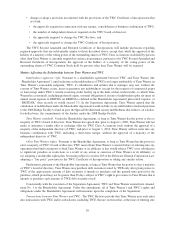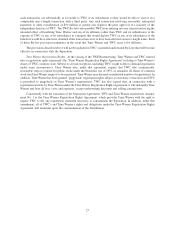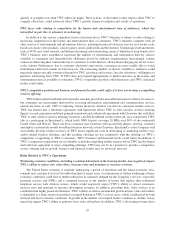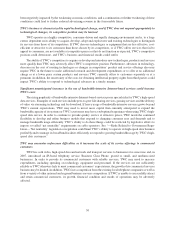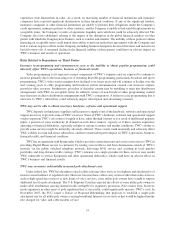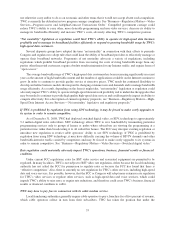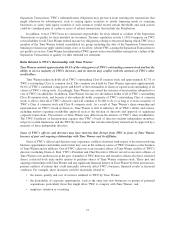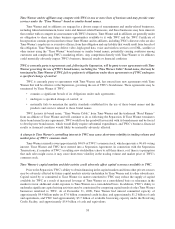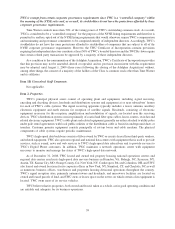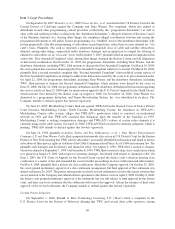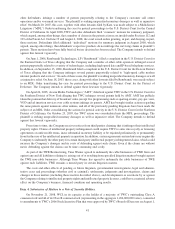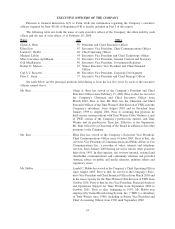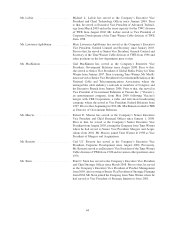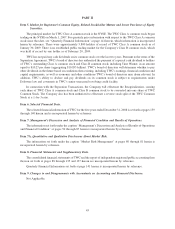Time Warner Cable 2008 Annual Report Download - page 46
Download and view the complete annual report
Please find page 46 of the 2008 Time Warner Cable annual report below. You can navigate through the pages in the report by either clicking on the pages listed below, or by using the keyword search tool below to find specific information within the annual report.Communications Act, local franchising authorities are allowed to impose a franchise fee only on revenue from
“cable services.” Following the FCC’s March 2002 determination that cable modem service does not constitute a
“cable service,” TWC and most other multiple system operators stopped collecting and paying franchise fees on
cable modem revenue.
The FCC has initiated a rulemaking proceeding to explore the consequences of its March 2002 order. If either
the FCC or a court were to determine that, despite the March 2002 order, TWC is required to pay franchise fees on
cable modem revenue, TWC’s franchise fee burden could increase going forward. TWC would be permitted to
collect those increased fees from its subscribers, but doing so could impair its competitive position as compared to
high-speed data service providers who are not required to collect and pay franchise fees. TWC could also become
liable for franchise fees back to the time TWC stopped paying them. TWC may not be able to recover those fees
from subscribers. Most courts interpreting the rules, including several instances involving TWC, have determined
that cable operators are not required to pay these fees on cable modem service.
Applicable law is subject to change.
The exact requirements of applicable law are not always clear, and the rules affecting TWC’s businesses are
always subject to change. For example, the FCC may interpret its rules and regulations in enforcement proceedings
in a manner that is inconsistent with the judgments TWC has made. Likewise, regulators and legislators at all levels
of government may sometimes change existing rules or establish new rules. Congress, for example, considers new
legislative requirements for cable operators virtually every year, and there is always a risk that such proposals will
ultimately be enacted. In addition, federal, state or local governments and/or tax authorities may change tax laws,
regulations or administrative practices that could negatively impact TWC’s operating results and financial
condition. See “Business—Regulatory Matters.”
Risks Related to the Separation
TWC may not realize some or all of the benefits that it expects from the Separation.
TWC believes that the Separation will result in several benefits to the Company, including increased long-term
strategic, operational and regulatory flexibility and a more efficient capital structure. The Company cannot predict
with certainty the extent to which these benefits actually will be achieved, if at all. Furthermore, even if some or all
of these benefits are achieved, they may not result in the creation of value for TWC’s stockholders.
If the Separation Transactions, including the Distribution, do not qualify as tax-free, either as a result of actions
taken or not taken by TWC or as a result of the failure of certain representations by TWC to be true, TWC has
agreed to indemnify Time Warner for its taxes resulting from such disqualification, which would be significant.
In addition, the restrictions imposed on TWC in connection with the tax treatment of the Distribution could limit
TWC’s ability to engage in certain corporate transactions.
The Separation Transactions are conditioned upon Time Warner’s receipt of a private letter ruling from the IRS
and Time Warner’s and TWC’s receipt of opinions of tax counsel confirming that the Separation Transactions
should generally qualify as tax-free to Time Warner and its stockholders for U.S. federal income tax purposes. The
ruling and opinions rely on certain facts, assumptions, representations, and undertakings from Time Warner and
TWC regarding the past and future conduct of the companies’ businesses and other matters. If any of these facts,
assumptions, representations or undertakings are incorrect or not otherwise satisfied, Time Warner and its
stockholders may not be able to rely on the ruling or the opinions and could be subject to significant tax liabilities.
Notwithstanding the private letter ruling and opinions, the IRS could determine on audit that the Separation
Transactions should be treated as taxable transactions if it determines that any of these facts, assumptions,
representations or undertakings are not correct or have been violated, or for other reasons, including as a result of
significant changes in the stock ownership of Time Warner or TWC after the Distribution.
Under the tax sharing agreement among Time Warner and TWC, TWC generally would be required to
indemnify Time Warner against its taxes resulting from the failure of any of the Separation Transactions to qualify
as tax-free as a result of (i) certain actions or failures to act by TWC or (ii) the failure of certain representations to be
made by TWC to be true. Due to the potential impact of significant stock ownership changes on the taxability of the
36


